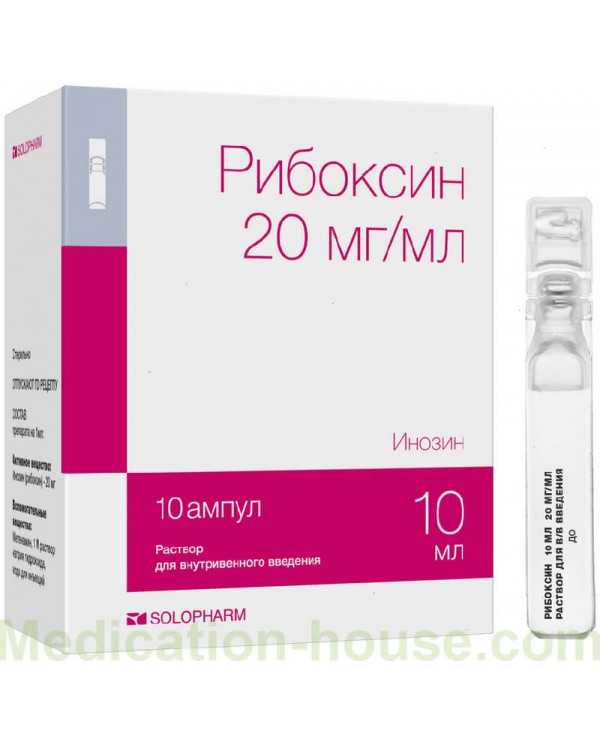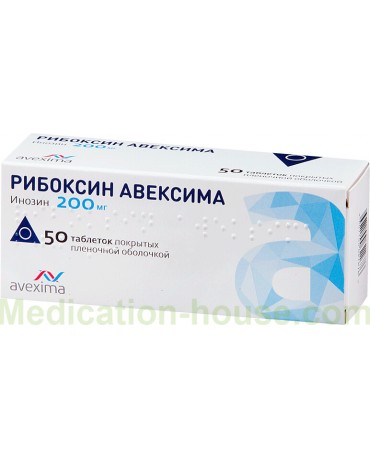Instruction for use of Riboxin injections
To buy Riboxin injections just add it to your shopping cart
Riboxin injections is a drug to stimulate metabolic processes, has antiarrhythmic and antihypoxic effects.
Release form and composition
The drug is available in the form of a solution for intravenous (IV) administration: a transparent, slightly colored or colorless liquid (5 or 10 ml each in polymer ampoules, in a cardboard box of 10 or 100 ampoules and instructions for use of Riboxin Buffus).
1 ml of solution contains:
active substance: inosine (riboxin) - 20 mg;
auxiliary components: methenamine (hexamethylenetetramine), sodium hydroxide (1 M sodium hydroxide solution), water for injection.
Pharmacodynamics
Riboxin injections is a drug used to stimulate metabolic processes, including in the treatment of heart diseases. It has antihypoxic and antiarrhythmic effects. The active ingredient of the drug is inosine (riboxin), a purine derivative, a precursor of adenosine triphosphate (ATP). Penetrating into cells, inosine has a positive effect on metabolic processes in the myocardium, increasing its energy balance. As a result of an increase in the strength of heart contractions and a more complete relaxation of the myocardium in diastole, the stroke volume increases. The substance is directly involved in glucose metabolism, activates metabolism under hypoxic conditions and in the absence of ATP, improves coronary circulation, activates xanthine dehydrogenase, and prevents the consequences of intraoperative renal ischemia.
The drug activates the metabolism of pyruvic acid, normalizes the process of tissue respiration, intensifies the synthesis of nucleotides, and increases the activity of certain enzymes of the Krebs cycle.
It causes a decrease in platelet aggregation, increases the regenerative capacity of myocardial tissues, the mucous membrane of the gastrointestinal tract and other tissues.
Pharmacokinetics
Inosine metabolism occurs in the liver. As a result, glucuronic acid is formed, which undergoes subsequent oxidation.
It is excreted through the kidneys in a small amount.
Indications for use
The use of the drug is indicated as part of the complex therapy of ischemic heart disease, myocardial infarction, cardiac arrhythmias caused by the intake of cardiac glycosides, with myocardial dystrophy caused by infectious diseases, and also as a means of pharmacological protection when the blood circulation is turned off during operations on an isolated kidney.
In addition, indications for the use of Riboxin injections are liver diseases (cirrhosis, hepatitis, fatty degeneration) and urocoproporphyria.
Contraindications
Absolute:
hyperuricemia;
gout;
period of pregnancy;
breast-feeding;
age under 18;
hypersensitivity to the components of the drug Riboxin injections.
Inosine should be used with caution in patients with renal insufficiency.
Riboxin injections, instructions for use: method and dosage
A solution of Riboxin injections in ampoules is used intravenously by slow jet or drip.
The infusion rate should not exceed 40-60 drops per minute.
For drip administration, the prescribed dose of the drug should be diluted in no more than 250 ml of isotonic sodium chloride solution or 5% dextrose (glucose) solution.
Recommended dosage: initial dose - 200 mg (10 ml) once a day. With good tolerance, the dose is then increased to 400 mg (20 ml) 1-2 times a day. The duration of the course of treatment is 10-15 days.
In case of acute disturbance of the heart rhythm, intravenous jet injection of the drug in a single dose of 200-400 mg is possible.
During surgical intervention for pharmacological protection of the kidney subjected to ischemia, the solution is injected intravenously in a stream 5-15 minutes before the renal artery is clamped in a single dose of 1200 mg (60 ml). Then, immediately after the restoration of blood circulation, the patient is additionally injected with 800 mg (40 ml) of riboxin solution.
Side effects
possible: the development of allergic reactions in the form of itching, hyperemia, urticaria;
rarely: against the background of long-term use - exacerbation of gout, an increase in the level of uric acid in the blood.
Overdose
Overdose symptoms have not been established.
Special instructions
If symptoms of allergic reactions (itching, hyperemia) appear, the drug should be discontinued immediately.
Application during pregnancy and lactation
It is contraindicated to use Riboxin injections during gestation and breastfeeding.
Childhood use
The efficacy and safety of using the drug for the treatment of children and adolescents has not been established, therefore it is contraindicated to prescribe Riboxin injections to patients under 18 years of age.
With impaired renal function
If there are indications for use, Riboxin injections should be used with caution in patients with renal insufficiency.
Drug interactions
With the simultaneous use of the drug Riboxin injections with other drugs, no interaction was detected.
Terms and conditions of storage
Keep out of the reach of children.
Store at a temperature of 15-25 ° C in a dark place.
Shelf life is 3 years.
Terms of sell
You can buy Riboxin injections without a prescription from a doctor.


